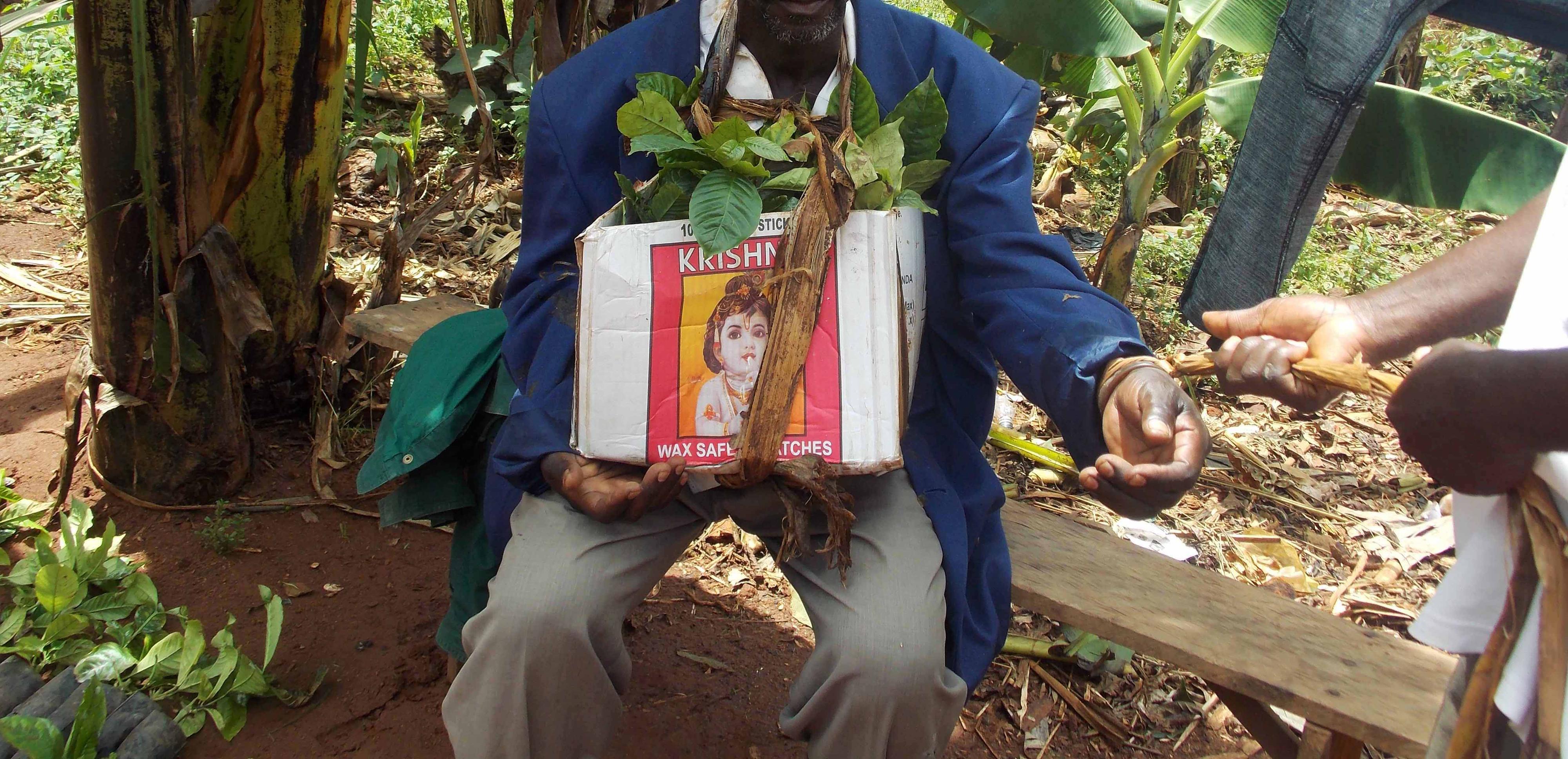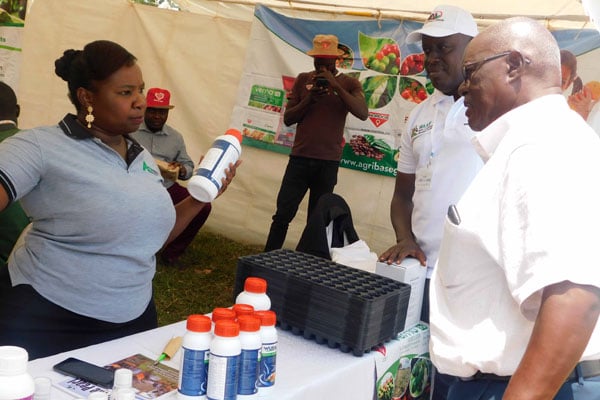Prime
Guarding against coffee farm thefts

A suspect thief of coffee plantlets with his loot tied across his neck. Photo/Michael J Ssali.
What you need to know:
- Farmers must ensure that they protect their gardens day and night by regular inspections. Keeping a fierce dog is very much encouraged because it will back and drive away thieves.
One of the most talked about violent robberies in July this year is the one made against Mr John Damulila a prominent coffee trader based in Kalisizo Town who was shot in the chest and in the mouth by robbers as he drove back to his place of work in Kalisizo from a bank in Kyotera Town.
He is currently undergoing treatment for the severe wounds in a hospital in Kampala.
It is widely believed that the attackers who rode on a motorbike were interested in the Shs93m that he had reportedly withdrawn from the bank to pay some farmers and traders that had delivered coffee to him at his coffee milling factory.
Coffee thefts
Throughout the ongoing coffee harvest season there have been countless reports of coffee thefts from gardens at night.
Around mid-June this year at Kalugulu Village, Kisekka Sub-county, in Lwengo District, two young men were arrested by police after being spotted during day time harvesting coffee from the garden belonging to Lawrence Sekyaya.
Unfortunately for them they picked mainly green cherries and wherever they went to sell the coffee it was rejected and one law abiding individual reported the young men to police which arrested them.
Valuable product
Shaffic Ssenyimba, Masaka Regional Coffee Extension Officer, Uganda Coffee Development Authority (UCDA) says his organisation entered into a partnership with police to fight all bad coffee farming practices including prompt arrest and trial of all coffee stealing individuals as well as those who pick green coffee cherries.
“Owing to the recent sharp rise in coffee prices most people realised that coffee was extremely valuable and a quick way to get large sums of money. So those who cannot produce the crop are now doing whatever they can to get coffee to sell. That is why there have been so many police cases related to coffee theft,” says Ssenyimba.
There have been widespread formations of coffee farmers’ cooperative societies in which coffee buying centres have been streamlined and only well-known people can buy coffee.
However in some coffee growing communities there are no such well-established centres and every “Tom, John and Henry” can pose as a coffee buyer.
Lack of well streamlined buying systems in some areas has created room for thieves to sell stolen coffee to unlicensed and unsuspecting buyers.
Ssenyimba says farmers must ensure that they protect their gardens day and night by regular inspections.
He said that keeping a fierce dog is very much encouraged because it will back and drive away thieves.
“Even for the farmers who keep their coffee in the yards at night a fierce dog will alert everyone in the household that there are strangers in the compound and give them a chance to phone the police all to shout for help from the neighbours,” he says.
Advice
Ssenyimba has observed that traders often keep farmers waiting at the coffee hulling factories to be paid till late in the evening which is risky.
“Imagine someone receiving cash late in the evening and having to make the journey back to his or her home on a boda-boda or a bicycle when almost everybody in the village is aware he or she has been paid cash for the coffee. Such practices attract robbery and it is dangerous not only for the owners of the hulling machines who pay for the coffee but it is dangerous for the farmers who receive the cash because there is a real possibility of gun wielding robbers invading the coffee buyers premises and making off with cash,” says Ssenyimba.
Payment through banks
Hajj Sowedi Sserwadda Chairman of Kibinge Coffee Farmers Cooperative Society Ltd, told Seeds of Gold that no member of his society whose membership is more than 2,000 has any reason to worry about the risk of robbers going to his or her home expecting to get huge sums of money.
“Every member of our society is also a member of Kibinge Coffee Farmers Micro-finance Ltd. We pay all our farmers by depositing their cash on their accounts and they pick it from the bank secretly at intervals and in amounts of their choice. We don’t encourage our members to keep large amounts of cash in their homes.”
He also said the farmers form village security committees during the coffee harvesting season which make almost daily patrols to minimize night coffee thefts from gardens.
Joseph Nkandu, Executive Director of National Union of Coffee Agribusinesses and Farm Enterprises (NUCAFE) has said that it is important for farmers not to demonstrate that they have cash in their pockets or in their homes.
“This is a digital age and farmers must be taught about the safety of digital financial transactions. All farmers should by now have a phone and they should be able to receive payment and to make payments on their phones. This requires them to safeguard their Mobile Money secret numbers to avoid losing money to fraudsters. Coffee buyers should begin issuing checks to farmers to go for their money from the banks and keep most of their money in the banks,” says Nkandu.
Report cases to police
With regard to thieves who secretly harvest coffee or other crops such as bananas from gardens whether at night or during the day, Nkandu advises farmers to involve police which normally uses sniffer dogs to catch the thieves.
Ssenyimba entirely agrees with Nkandu about the efficiency of sniffer dogs in tracing farm thieves. “In the past few months the dogs have embarrassed a lot of young men who believed they would make money by stealing coffee from other people’s gardens,” he says.
Joseph Kasekende, a model coffee farmer, and agricultural services extension officer in Rakai District said, “Normally the robbers are among the people that work or live closely with those they attack.
Total secrecy is therefore necessary for the farmer. When you tell your employees that you are going to the bank to get the money for paying their salaries, you could be inviting trouble for yourself. One of them could communicate the news to some robbers who could attack you on your way from the bank.
It is always the people close to you that know your plans and programs who turn round to rob you of your money. It is the people that work in your garden that easily know where the ripe coffee is and where to pass to steal it.”
He further advises farmers to surround their homes with chain link fences to keep thieves at bay.
He heads a coffee farmers’ group and these days they own a coffee hulling factory. He says they totally avoid paying member farmers by cash.
“We require all our members to have a mobile phone and a bank account so that we pay them through the bank or through Mobile Money,” he says.
With regard to the thieves who uproot just planted coffee seedlings for planting in their own gardens, Kasekende advises farmers to talk to the police which most likely will resort to using sniffer dogs to trace the thieves.
Advice
Joseph Nkandu, Executive Director of National Union of Coffee Agribusinesses and Farm Enterprises (NUCAFE) has said that it is important for farmers not to demonstrate that they have cash in their pockets or in their homes.
“This is a digital age and farmers must be taught about the safety of digital financial transactions. All farmers should by now have a phone and they should be able to receive payment and to make payments on their phones,” says Nkandu.




